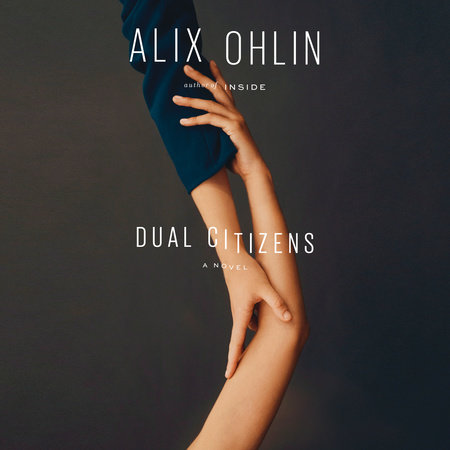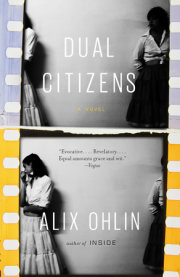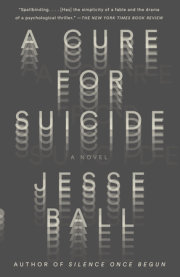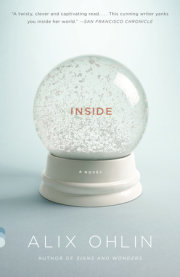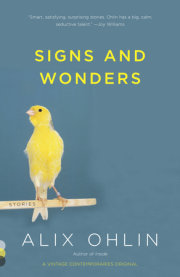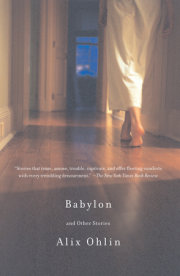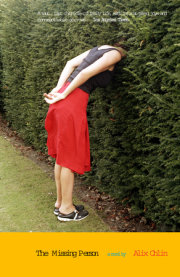Prologue
The story of Scottie’s life—which is, of course, the story of my life too—begins with my sister Robin. It’s strange how little we talk about it now. Of the three of us, I’m the only one who dwells on our history, probably because I’m the one who chose and formed it. If I bring up that day in the Laurentians, Robin says she doesn’t remember much about it. I find this impossible to imagine. For me, the opposite is true, with every detail lodged unwaveringly in my memory, recorded in detail, like a film I can replay at any time.
It goes like this: a sunny day in June, the leafy heat of summer at odds with my frozen terror as I stood fixed to the ground. The air thick and still as a wall against Robin’s ragged breath.
And the wolf my sister had named Catherine inspecting us both with her yellow eyes.
Robin was thirty-eight weeks pregnant at the time, and she’d just irritably informed me that pregnancy lasted ten months, not nine. She was angry about this, as if there had been a conspiracy to keep her misinformed. She was angry in general, because she was hot and uncomfortable and couldn’t sleep. We were walking down a trail behind her house that led to a canopy of pine trees, hoping the air would be cooler there. Walking was all Robin wanted to do, although she complained about this, too: her hips hurt, her knees hurt, her ribs hurt. Complaining wasn’t typical of my sister, who was stoically, even savagely independent, and it worried me. We stopped every few steps so she could catch her breath, and when we did, I watched her stroke her belly; she wasn’t in other ways tender toward the baby inside her, or herself.
She frowned. “What are you doing?”
“Nothing.”
“You’re touching yourself,” she said.
I hadn’t realized until then that I was imitating her, making myself a mirror. My palm was at against my own stomach, though there was nothing to stroke. I flushed with embarrassment, and my sister gave her harsh bark of a laugh.
“It’s okay,” she said. “I get it.”
But how could she get it? She didn’t live in my body any more than I could live in hers. We stood body to body, sister to sister, across an impossible divide.
To change the subject, I began telling her about a cache of old films that had been discovered in a permafrost landfill beneath an ice rink in Dawson City, Yukon. Dating from the early twentieth century, the films had belonged to a movie house. Back in those days, I said, movies traveled from California to cities like Calgary and Vancouver before heading to Whitehorse and eventually reaching the mining community in Dawson City, at which point it made no sense to ship them back to their point of origin. So they accumulated there, an accidental archive. The films were made of cellulose nitrate, a material known to disintegrate, melt, even spontaneously combust. If they hadn’t been buried below the rink—nestled alongside chicken wire and dirt and bits of wooden debris—they might have burned the whole town down.
“Movies used to explode?” Robin said.
I nodded. I told her how the movie house went out of business and dumped the films, which were found decades later by a backhoe operator clearing the land for a new recreation center. The story fascinated me, with its unlikely combination of flammable film and icy bedrock, of preservation by neglect, how a town had maintained its history by forgetting it. Most silent films of that era have been lost to fire or decay, but abandonment saved these ones. As for my sister, she’d heard me go on about this kind of trivia for years—I was a collector of arcane information, especially anything relating to film—and I suppose she must have been used to it. She was listening now, so quietly that it took me longer than it should have to notice something was wrong.
Her eyes were trained on a point behind my head. “Look,” she said.
We saw the wolf trot out of the forest like a lost dog looking for its home. From her strange gait, one leg hobbled, we knew it was Catherine. Her grey-brown fur looked knotted and flat, her body narrow-hipped and sinewy. It was possible, we thought later, that she was searching for her pack. To me it hardly matters; her motives aren’t my concern. What I remember is her graceless stagger, and how quickly she moved despite it. How when she bore down on us, so close that I could see her eyes, I couldn’t tell whether she recognized us, whether the bond Robin had nurtured with her was sturdy, or significant, or the slightest bit present in her mind.
What happened next was my fault.
The wolf ran toward Robin as if to jump on her, and I pulled my sister sharply to the side, scared for both her and the baby. Robin wrestled against me—wanting to greet Catherine, I guess, or at least to see her close-up. A fit of vertigo washed over me then, the sky and earth changing places; everything solid jellied and spun. I clung to whatever I could grasp as my vision hazed, and inside my ears was the crash and roll of some invisible ocean. I think I grabbed Robin’s shoulder, but it might have been her leg—that’s how disoriented I was. In the push and pull between us Robin lost her balance, stumbled, and fell. The wolf kept going, running past us as if we didn’t even exist.
Slowly my eyes cleared, and the ground assembled itself beneath me. Vertigo passing is like an earthquake in reverse: pieces knit them- selves back together, the world unshudders and comes to rest.
Next to me, Robin moaned, a terrible, keening sound.
“Are you all right?” I said.
She didn’t answer. Her face was an ashy color I’d never seen before, and she pressed a hand to her belly again, the gesture not gentle this time.
I cradled my sister’s head in my lap but she seemed hardly to notice my presence, much less be eased by it. Her body was hot to my touch, her hair sticking wetly to my hand.
Then we heard the rest of the pack begin to vocalize in rolling harmonics, whether in greeting to Catherine or for some other reason. Their silvery howls rose and fell, rose and fell. I thought it was spooky, but Robin’s face relaxed and she opened her eyes. What I found wild, she found a comfort, and that had always been a difference between us.
“Where’s Catherine?” she said.
I told her I didn’t know; the wolf had gone. My sister struggled to sit up, and I could see she was hurting, but there was no stopping her from standing. There had never been any stopping Robin from whatever she wanted to do. She got to her feet, though her knees buckled once and she had to brace herself against me as I tried and failed to coax her back to the house.
Only my sister would have ignored going into labor in order to look for a wolf. Only my sister would have asked, through the pain, “Where did she go?”
Copyright © 2019 by Alix Ohlin. All rights reserved. No part of this excerpt may be reproduced or reprinted without permission in writing from the publisher.

